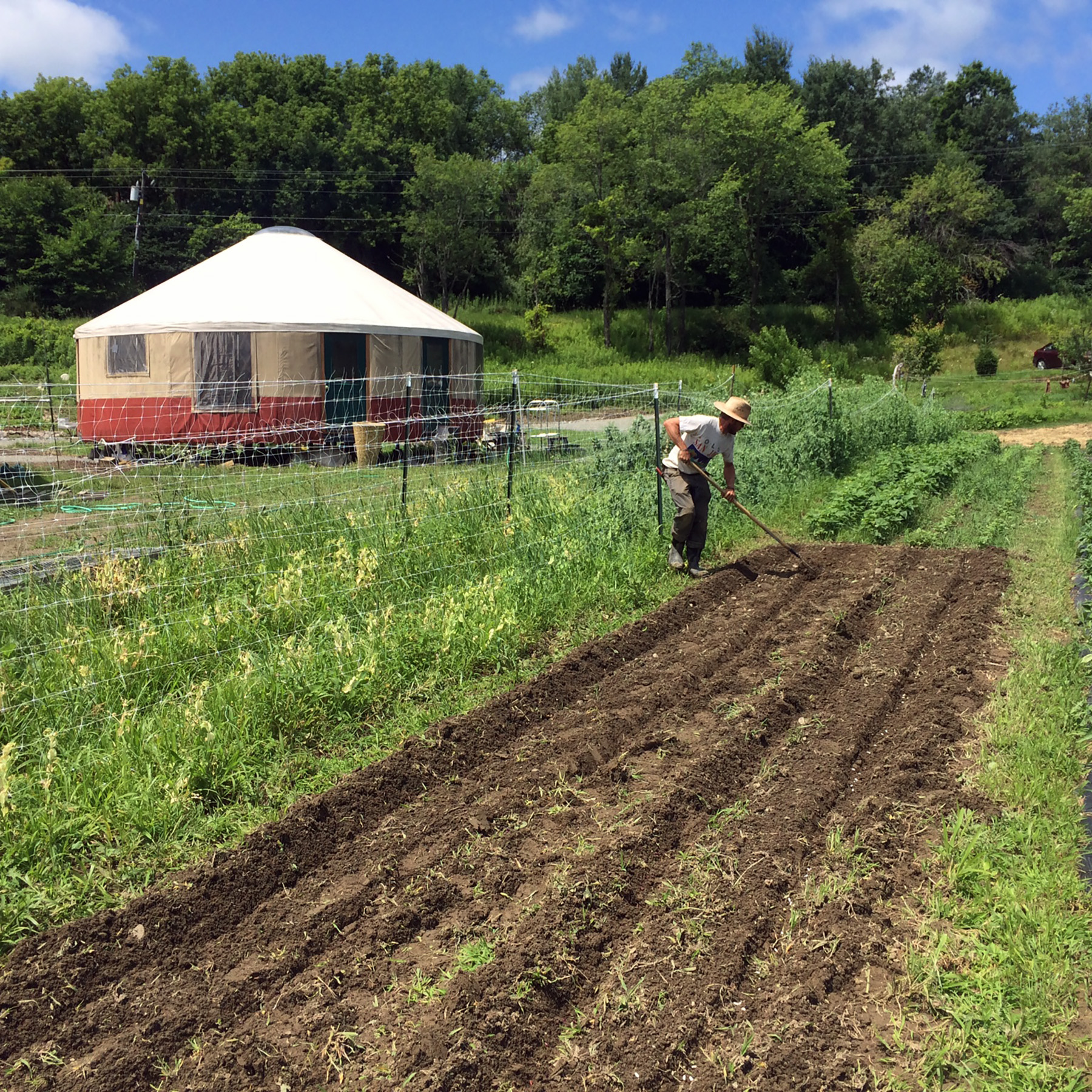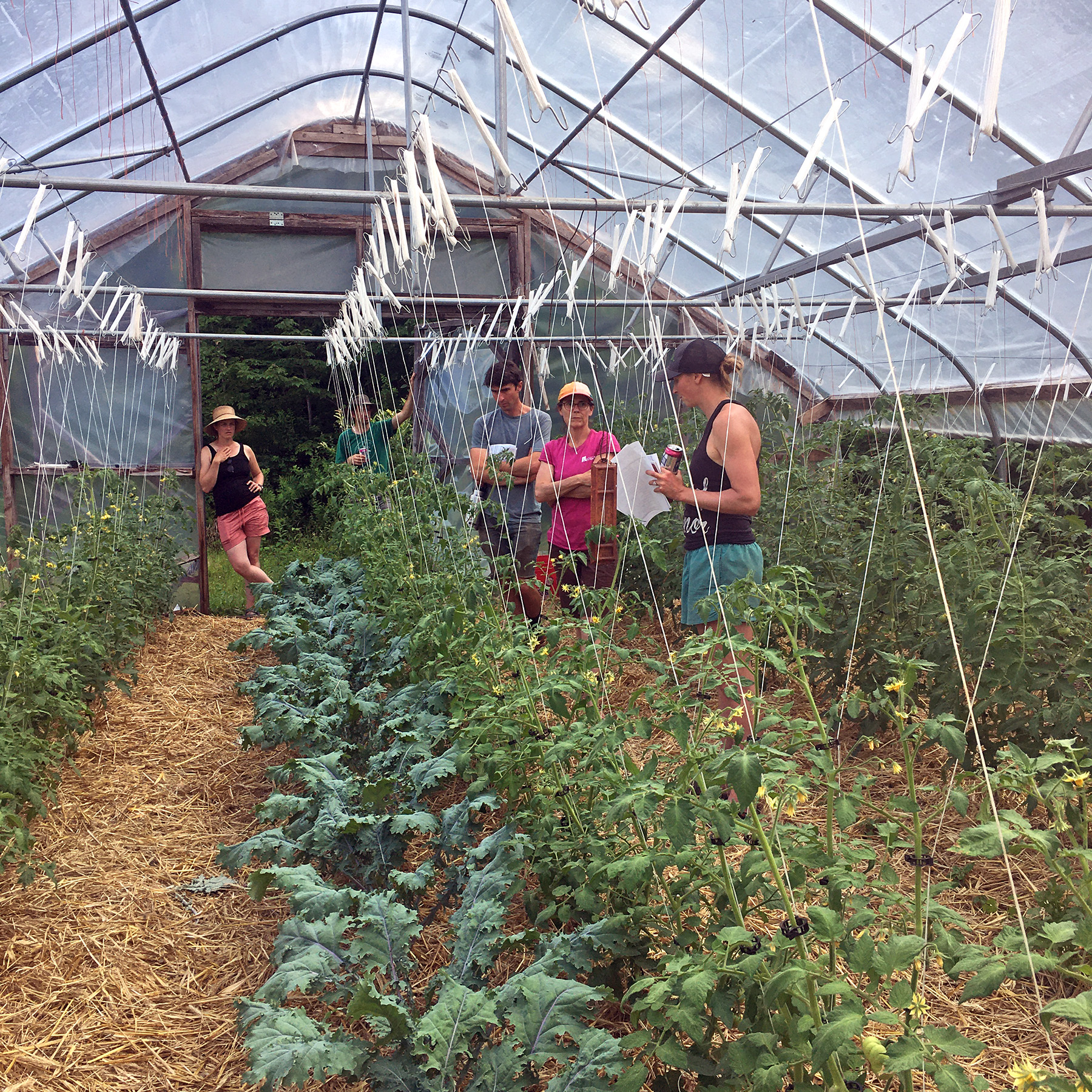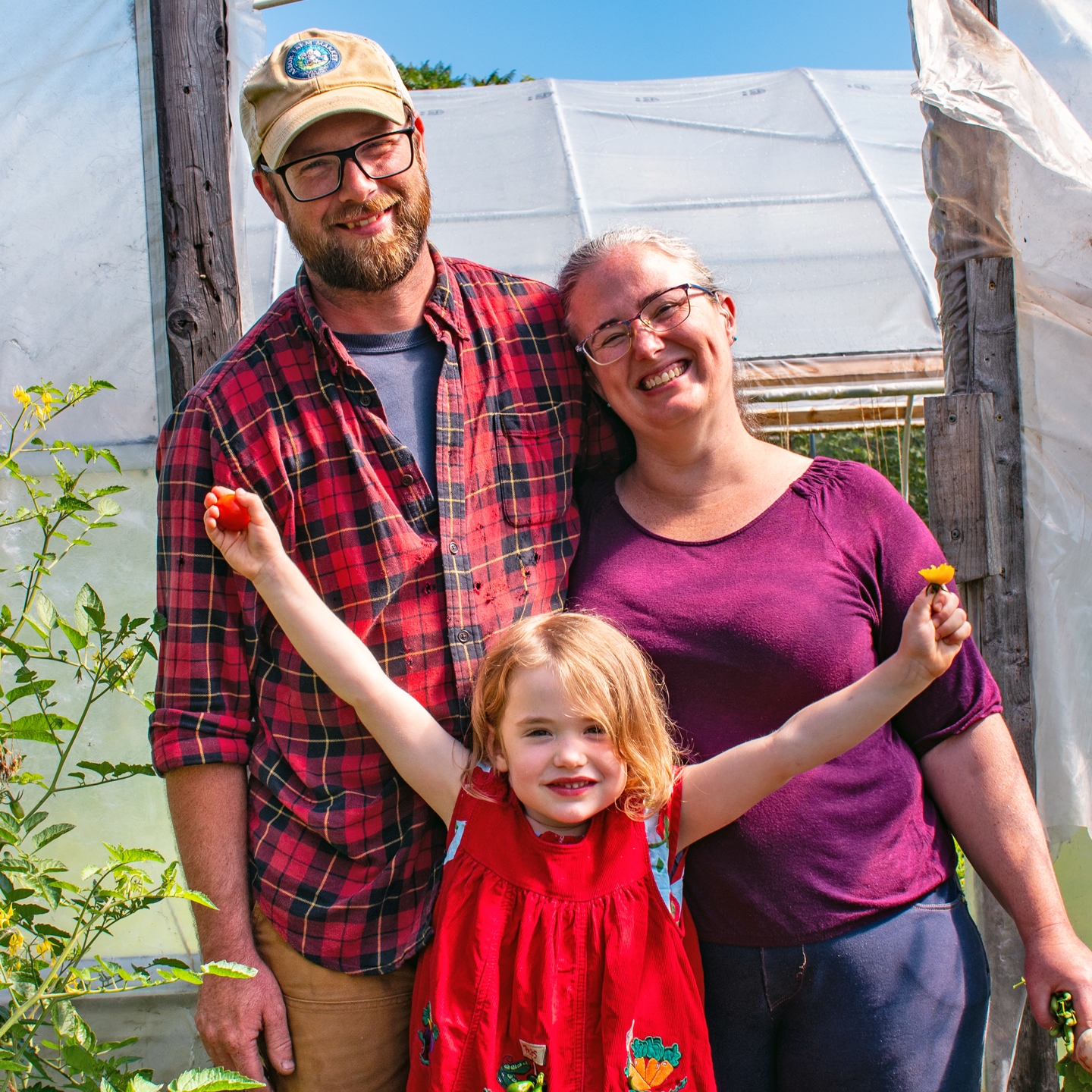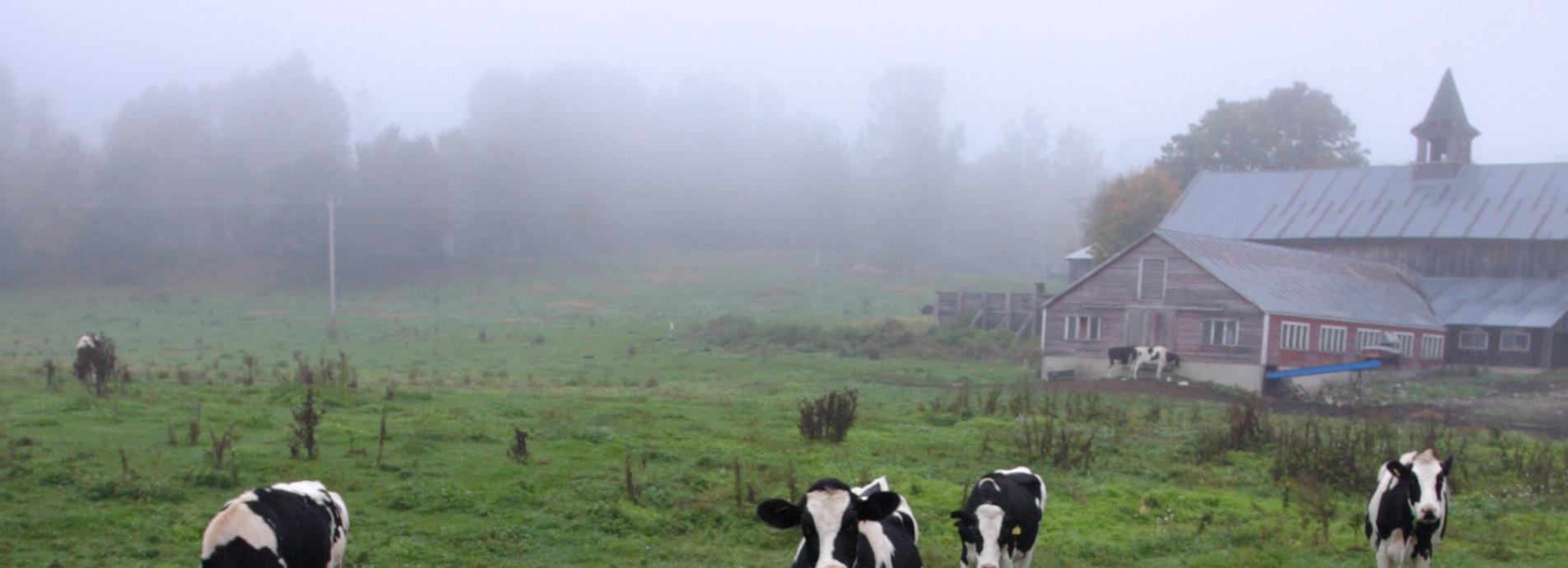January 10, 2025
NOFA-VT’s Farmer Services team provides a great deal of direct services to farms in a one-on-one format, though we also offer cohort-based programs because we believe that farmers have incredible knowledge among them and the simple act of coming together creates the conditions for shared learning and invaluable relationship building. Over the past two years, NOFA-VT has worked in collaboration with Becky Maden, Vegetable Nutrition Specialist at UVM (and NOFA-VT Board Member), to facilitate a cohort of small-scale vegetable growers focused on soil health. This is the third cohort to come out of the Jack Lazor Memorial Soil Stewards program, inspired by the legacy of Jack Lazor, a farmer, cofounder of Butterworks Farm, and soil health enthusiast who passed away in 2020. Over the past two years, this group has met regularly, visiting each others’ farms, building relationships, and learning from each other. The group has often expressed the inherent value of getting off their respective farms during the season to connect with other growers and see other farms in action. The cohort structure allows space for sharing specific practices and building social networks among farmers who may otherwise feel isolated. In the following reflections, three participant farmers share their experiences with this program and their enthusiasm for the cohort model.
Ryan Demerest of Naked Acre Farm
Being a part of NOFA-VT’s Soil Health Cohort over the past couple of years has been an absolute joy and has reinforced my identity as a grower. Becky and Megan created an incredibly valuable program that was tailored to the various needs that we expressed as the next generation of small-scale growers. The program allowed for deep dives into specific topics, generated important discussions that highlighted the group’s diversity, and fostered a sense of camaraderie. Honestly, I wish the cohort could continue indefinitely. The nature of being a grower is often isolating, but I believe the best way to improve as a grower is through discussion and witnessing other operations. This program offered not only solidarity but also the opportunity to connect and exchange ideas that serve to better ourselves in our challenging profession. It was a vehicle that afforded access to each other, to see other farms, and to connect with the deep well of knowledge offered by Becky at UVM Extension and through Megan’s experience, both from her work at NOFA-VT and her previous experiences as a farmer.
Eleven years into my growing career, I feel like I have a good foundation for successful farming on our land. Meeting as a group provided a framework to learn and discuss tweaks to the foundation that would benefit my practices in the future. We were able to deeply discuss and demonstrate our own unique methods, thereby creating a type of knowledge pool that we each could individually draw upon for our specific needs. Some especially helpful topics were bed preparations, fertility sources and methods, practices around cover cropping and soil health, and, as always, work-life balance and lifestyle improvements. The knowledge generated from the cohort provided a fresh perspective to continue thinking about how to incorporate better practices in the future. For me personally, the direct interaction with growers served as a gauge for my success. Our meetings and field trips provided insight into where I could improve, but also where I was already succeeding. Welcoming cohort members to visit my farm provided an especially important component because it offered valuable feedback and validation.
Farming is slow and change occurs over time. I liken it to changing the course of a massive ship. Having this experience with the cohort while “captaining” my operation provided valuable insight as to the decisions needed to steer my operation. I want to ensure that what I do is intentionally kind to our soil and to the broader environment, biologically and socially. Being a part of this group with soil health as its guiding principle supported this drive and opened the door to more thoughtful ways of treating the soil and ultimately, the earth. The dynamic of the group was sensitive, kind, generous, and supportive, creating an environment that fostered learning and growth. I think this stems largely from the space that Megan and Becky created and the level of trust established in our group. I feel incredibly fortunate to live in Vermont and to be a part of the agricultural community where we have close relationships with folks like Megan and Becky whose overarching goal is the enrichment of the growing community. Plus, the cohort was just really fun!

Hannah Blackmer, Fieldstone Farm, Northfield, VT
To be on a learning journey with a group of farms, on such a deep and enduring topic as soil health, for an extended period of time was transformative. As someone who runs a farm solo, I often feel isolated and stagnant, stuck in my head and my own day-to-day routines. This cohort provided a framework to explore the topic of soil health on our farms, while also fostering deeper farmer-to-farmer relationships. The semi-structured spaces created through the cohort fit my personal learning style and facilitated a deeper connection than that typically achieved by a one-off event or conference. The experience also helped me stay curious and inspired throughout the growing season and into winter planning sessions.
One of the main “aha!” moments inspired by this cohort was the practice of removing as little organic matter from our beds as possible. Previously, when a cash crop such as lettuce was finished, we’d cut the plants out, bring them to the compost pile, run through the bed looking for weeds going to seed, and then run a tarp over the bed to solarize anything left behind. Now, instead of removing all that material, we run through the bed looking for problematic weeds, cut and drop the crop right on the surface, then drag a tarp over to solarize the remaining material, allowing it to decompose in place. This practice doesn’t work for everything we grow. For example, bigger, woodier plants like broccolini still need to be removed from the field as they take much longer to break down, but the practice improved our ability to keep organic matter and nutrients in our growing spaces, and as a bonus, vastly reduced trips back and forth to our compost pile. We’re also now looking at weeds through this lens: weeds that have become too big to hoe out but are not yet at a seeding phase are cut at the soil surface and laid in the pathways or used to “mulch” the crop growing in that bed, again keeping organic matter and nutrients in our growing spaces.
I looked forward to each farm tour, not only as an opportunity to get away from my own farm for a few hours but also as an opportunity to be introduced to new tools to add to my expanding soil health toolbox. The tours also provided helpful opportunities to continue building relationships and watch members of this farming community experiment, take risks, and generally be nerds. Their willingness to explore and be vulnerable encouraged my own ability to do so; many of the conversations I had, whether one-on-one or with a small group, were foundational building blocks of support. A group of people dedicated to learning about a topic, and dedicated to being resources for each other? Count me in! Cohorts rock!

Patrick Helman, Sandy Bottom Farm, Ise La Motte, VT
Over the past two years, I have been lucky enough to meet periodically with a group of farmers who share my interest in soil health. Meeting on other farms and learning on-site has been invaluable, both for my farm and for my personal growth. I have become a substantially better farmer as a result of this cohort. We have implemented new practices on our farm including some no-till plantings, several crop additions, longer greenhouse rotations, modifications to our season extension, and paperpot transplanting. We have also expanded other practices based on our experiences with this group, including much more cover cropping, tarping, and exclusion netting.
On a personal level, being able to get away from my farm amid the growing season frenzy to interact with other farmers who have similar operations was valuable; I find that without a good external justification (like this group) it is otherwise difficult for me to create space for this. The relationships between farmers that have developed as a result of this group are likely deeper, and in some cases probably wouldn't have happened otherwise. Even from a geographic standpoint; the group brought together farmers from a substantial portion of the state, bringing a richness of experience and perspective that wouldn't have happened without this program. While outside the stated scope of the cohort, combating what can sometimes feel like isolation by bringing these farmers together is indeed a worthy outcome.
A group like this can't happen without someone like Megan, whose work facilitating meetings, keeping us all on track, and finding time in over a dozen busy farmers' midseason schedules made this group possible. Without her (and NOFA-VT's) contribution, I doubt something like this could be maintained over a two-year span. Becky Maden, from UVM Extension, also facilitated and taught at every meeting, which I found tremendously helpful as a farmer somewhat new to regular soil testing and navigating the intricacies of soil health. She provided a focus for each farm visit and a scientific lens through which to interpret the various practices we encountered. I found this group to be very valuable and I am glad to have been a part of it!

This winter NOFA-VT will launch another Soil Health Stewards cohort for vegetable growers. We’ll accept applications through January and bring the group together for our first gathering in February. The specific topics and structure of the group will be informed by its participants. We look forward to bringing together another group of enthusiastic growers to support each other and build upon the legacy of Jack Lazor by learning together to be the best soil stewards they can be!
To learn more, contact Megan Browning, NOFA-VT Farmer Services Program Facilitator, at [email protected] or 802-434-7184.

